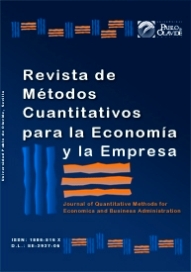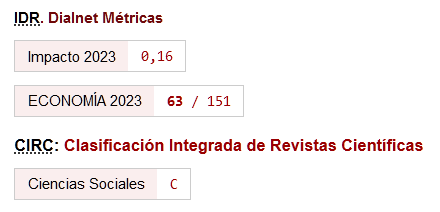Eficiencia Operativa, Financiera y Económica de PEMEX: Un Análisis Envolvente de Datos del Período 2011-2021
DOI:
https://doi.org/10.46661/rev.metodoscuant.econ.empresa.8773Palabras clave:
Minería, extracción y refinado: hidrocarburos, eficiencia asignativa, modelos matemáticos de asignaciónResumen
La eficiencia técnica de PEMEX representa un aspecto esencial en el entendimiento de su capacidad para potenciar la rentabilidad petrolera y, en consecuencia, incrementar la calidad de vida de un gran número de mexicanos. A pesar de los significativos cambios derivados de la Reforma Energética de 2013 y el notable plan de inversión promovido por la administración actual, PEMEX sigue enfrentando retos considerables en términos de eficiencia y desempeño. Para evaluar su eficiencia técnica en sus facetas operativa, financiera y económica, recurrimos a un modelo de programación lineal fundamentado en el Análisis Envolvente de Datos (DEA). Los resultados obtenidos exhiben que PEMEX muestra resultados de eficiencia superiores a la media de la muestra, en sus indicadores operativos y financieros, sin embargo, dispone de un amplio margen de mejora en métricas de desempeño económico. Finalmente, delineamos un conjunto de posibles soluciones para abordar las cuestiones de gobernanza corporativa y fiscal de dicha empresa, con el objetivo de mejorar su eficiencia técnica.
Descargas
Citas
Al-Mana, A., Nawaz, W., Kamal, A., & Koç, M. (2020). Financial and operational efficiencies of national and international oil companies: an empirical investigation. Resources Policy, Elsevier, 68, 101701. https://doi.org/10.1016/j.resourpol.2020.101701
Atris, A. M., & Goto, M. (2019). Vertical structure and efficiency assessment of the US oil and gas companies. Resources Policy, 63, 101437. 1-13. https://doi.org/10.1016/j.resourpol.2019.101437
Banker, R. D., Charnes, A., & Cooper, W. (1984). Some models for estimating technical and scale inefficiencies in data envelopment analysis. Management Science, 30(9), 1078-1092.https://doi.org/10.1287/mnsc.30.9.1078
Cabrales, S., Bautista, R., & Benavides, J. (2017). A model to assess the impact of employment policy and subsidized domestic fuel prices on national oil companies. Energy Economics, 68, 566-578. https://doi.org/10.1016/j.eneco.2017.10.038
Cámara de Diputados del H. Congreso de la Unión. (2014). Ley de Petróleos Mexicanos. Disponible en:https://www.diputados.gob.mx/LeyesBiblio/pdf/LPM_110814.pdf
Cámara de Diputados del H. Congreso de la Unión. (2021). Ley de Ingresos de la Federación para el Ejercicio Fiscal de 2022 publicada en el Diario Oficial de la Federación (12 de diciembre de 2021). Disponible en: https://www.diputados.gob.mx/LeyesBiblio/pdf/LIF_2022.pdf
Charnes, A., Cooper, W., & Rhodes, E. L. (1978). Measuring efficiency of decision making units. European Journal of Operational Research, 2(6). 429-444. https://doi.org/10.1016/0377-2217(78)90138-8
Coelli, T., Prasado Rao, D., O' Donnell, C., & Battese, G. (2005). An Introduction to Efficiency and Productivity Analysis. New York: Springer.
Cook, W., & Seiford, L. (2008). Data Envelopment Analysis - Thirty year on. European Journal of Operational Research, 192(1). 1-17.https://doi.org/10.1016/j.ejor.2008.01.032
Cooper, W. W., Seiford, L., & Zhu, J. (2011). Handbook on Data Envelopment Analysis. New York: Springer.https://doi.org/10.1007/978-1-4419-6151-8
Eller, S., Hartley, P., & Medlock III, K. (2007). Empirical evidence on the operational efficiency of national oil companies. The Changing Role of National Oil Companies in International Energy Markets, 40, 2-36. Disponible en: http://large.stanford.edu/publications/power/references/baker/studies/noc/docs/NOC_Empirical.pdf
Farrell, M. J. (1957). The measurement of productive efficiency. Journal of Royal Statistical Society, 120(3), 253-281. https://doi.org/10.2307/2343100
Hartley, P., & Medlock III, K. (2008). A model of the operation and development of a National Oil Company. Energy Economics, 30(5), 2459-2485. https://doi.org/10.1016/j.eneco.2007.12.017
Hawdon, D. (2003). Efficiency, performance and regulation of the international gas industry-a bootstrap DEA approach. Energy Policy, 31(11), 1167-1178. https://doi.org/10.1016/S0301-4215(02)00218-5
Heller, P., Mahdavi, P., & Schreuder, J. (2014). Reforming National Oil Companies: Nine Recommendations. Natural Resource Governance Institute, 1-24. Disponible en: https://resourcegovernance.org/sites/default/files/documents/nrgi_9recs_eng_v3.pdf
Jara-Bertin, M., Musacchio, A., & Wagner, R. (2022). Leviathan as a financial godfather: Debt advantages of wholly state-owned enterprises. Global Strategy Journal. 14(2). 225-251. https://doi.org/10.1002/gsj.1457
Lim, C., & Lee, J. (2020). An analysis of the efficiency of the oil refining industry in the OECD countries. Energy Policy, 142, 111491.
https://doi.org/10.1016/j.enpol.2020.111491
Lu, L., Zhang, J., Yang, F., & Zhang, Y. (2020). Evaluation and prediction on total factor productivity of Chinese petroleum companies via three-stage DEA model and time series neural network model. Sustainable Computing: Informatics and Systems. 27(3), 100397.
https://doi.org/10.1016/j.suscom.2020.100397
Martínez-Hernández, F.A. & Herrera-Aguilar, S. (2021). Pemex, su reestructuración corporativa, financiera y productiva y los efectos de ésta sobre la balanza comercial petrolera. El Trimestre Económico, LXXXVIII 1-39, 143-180. https://doi.org/10.20430/ete.v88i349.1005
Musacchio, A., Pineda Ayerbe, E., & Garcia, G. (2015). State-Owned Enterprise Reform in Latin America. Issues and Possible Solutions. Inter-American Development Bank. Fiscal and Municipal Management Division, 2-48. https://doi.org/10.18235/0000128
Natural Resource Governance Institute. (Mayo de 2022). National Oil Company Database. Disponible en: https://www.nationaloilcompanydata.org/
Ohene-Asare, K., Turkson, C., & Afful-Dadzie, A. (2017). Multinational operation, ownership and efficiency differences in the international oil industry. Energy Economics, 303-312. https://doi.org/10.1016/j.eneco.2017.10.006
Petróleos Mexicanos. (2021). Plan de negocios de Petróleos Mexicanos y sus empresas productivas subsidiarias 2021-2025. Disponible en: https://www.pemex.com/acerca/plan-de-negocios/Documents/pn_2021-2025-completo.pdf
Petróleos Mexicanos. (2022). Plan de negocios de Petróleos Mexicanos y sus empresas productivas subsidiarias 2023-2027. Disponible en: https://www.pemex.com/acerca/plan-de-negocios/Documents/pn_2021-2025-completo.pdf
Ramírez-Cendrero, J., & Paz, M. (2017). Oil fiscal regimes and national oil companies: a comparison between Pemex and Petrobras. Energy Policy, 101, 473-483. https://doi.org/10.1016/j.enpol.2016.11.009
Silva Gutierrez, D., Bonilla, D., & Moreno Vite, A. (2021). Energy reform in Mexico and its impact on Pemex productivity. The Extractive Industries and Society.8(2), 200-230. https://doi.org/10.1016/j.exis.2021.02.006
Silva Gutierrez, D., Paz, M., & Moreno Vite, A. (2021). Factors that explain the results of the national oil companies: The impact of the fiscal role on Pemex's results. 74, 102280. 1-14. Resources Policy. https://doi.org/10.1016/j.resourpol.2021.102280
Thompson, R., & Dharmapala, P. (1996). DEA/AR efficiency and profitability of 14 major oil companies in U.S. exploration and production. Computers & Operations Research, 23(4), 357-373. https://doi.org/10.1016/0305-0548(95)00044-5
Toshiyuki, S. (2000). Stochastic DEA for restructure strategy: an application to a Japanese petroleum company. Omega, 28(4), 385-398. https://doi.org/10.1016/S0305-0483(99)00069-9
Wang, Q., Zhao, Z., Zhou, P., & Zhou, D. (2013). Energy efficiency and production technology heterogeneity in China: A meta-frontier DEA approach. Economic Modelling, 35(C), 283-289. https://doi.org/10.1016/j.econmod.2013.07.017
Wolf, C. (2009). Does ownership matter? The performance and efficiency of State Oil vs. Private Oil (1987-2006). Energy Policy, 37(7), 2642-2652. https://doi.org/10.1016/j.enpol.2009.02.041
Xun, A., Hanrui, B., & Xiaoyang, Z. (2011). A DEA approach to evaluate economic and social roles of NOCs. Energy Procedia, (5), 763-767. https://doi.org/10.1016/j.egypro.2011.03.134
Zha, Y., Song, A., Chuanyong, X., & Yang, H. (2012). Dealing with missing data based on data envelopment analysis and halo effect. Applied Mathematical Modelling, 37(9), 6135-6145. https://doi.org/10.1016/j.apm.2012.11.015
Zhou, D., Wu, F., Zhou, X., & Zhou, P. (2016). Output-specific energy efficiency assessment: a data envelopment analysis approach. Applied Energy, 177, 117-126. https://doi.org/10.1016/j.apenergy.2016.05.099
Publicado
Cómo citar
Número
Sección
Licencia
Derechos de autor 2024 Junior Alfredo Martínez Hernández , Edgar David Gaytán Alfaro

Esta obra está bajo una licencia internacional Creative Commons Atribución-CompartirIgual 4.0.
El envío de un manuscrito a la Revista supone que el trabajo no ha sido publicado anteriormente (excepto en la forma de un abstract o como parte de una tesis), que no está bajo consideración para su publicación en ninguna otra revista o editorial y que, en caso de aceptación, los autores están conforme con la transferencia automática del copyright a la Revista para su publicación y difusión. Los autores retendrán los derechos de autor para usar y compartir su artículo con un uso personal, institucional o con fines docentes; igualmente retiene los derechos de patente, de marca registrada (en caso de que sean aplicables) o derechos morales de autor (incluyendo los datos de investigación).
Los artículos publicados en la Revista están sujetos a la licencia Creative Commons CC-BY-SA de tipo Reconocimiento-CompartirIgual. Se permite el uso comercial de la obra, reconociendo su autoría, y de las posibles obras derivadas, la distribución de las cuales se debe hacer con una licencia igual a la que regula la obra original.
Hasta el volumen 21 se ha estado empleando la versión de licencia CC-BY-SA 3.0 ES y se ha comenzado a usar la versión CC-BY-SA 4.0 desde el volumen 22.










